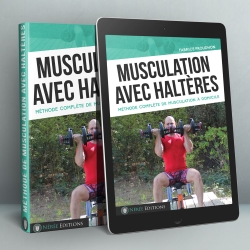Article assez intéressant, surtout sur l'histoire de la température à la quelle le training se fait et les modifications hormonales que cela implique sur la sensation de faim==> le body fat plus élevé pour les nageurs
In one study, researchers compared collegiate swimmers and collegiate distance runners [2].
Although the runners had lower body fat levels than the swimmers (7% vs. 12% for male runners vs. swimmers, and 15% vs. 20% for women), detailed three-day food records and one-day activity records offered no convincing explanation as to why.
Professor Louise Burke, Head of Nutrition at the Australian Institute of Sport, also points out that competitive swimmers typically have body fat levels that are higher than those of runners or cyclists who expend a similar amount of energy when they train.
"Many female swimmers have fought well-publicized battles with their body fat levels," says Burke.
"They are generally prescribed 'land training' (running or cycling) in addition to their many laps of the pool in the belief that it is a necessary treatment to produce lower skinfold levels."
More interesting still, research published in the American Journal of Sports Medicine shows that swimming has no effect on weight loss [1].
Professor Grant Gwinup compared three exercise programs (walking, cycling and swimming) for three months. Each program began with up to 10 minutes of daily exercise. The length of each workout was increased by five minutes every week.
Test subjects following the walking program lost 17 pounds of weight during the three-month study.
Those following the cycling program lost 19 pounds of weight.
However, subjects following the swimming program actually gained 5 pounds.
In other words, subjects who walked or cycled lost weight, while the swimmers gained weight.
But that’s only half the story.
In a similar study, University of Utah researchers compared the effects of aerobic exercise in water versus walking on land on weight loss [5].
A group of 38 middle-aged obese women was assigned to one of three groups:
Walking on land.Swimming.Walking in water at the shallow end of a pool.
After 13 weeks, all three groups lost, on average, 13 pounds in weight. There were no significant differences between groups.
So the swimmers were able to lose just as much weight as those following the land-based walking program.
Why does one study show that swimming is just as effective as walking when it comes to weight loss, while the other doesn't?
A closer look at the research reveals why...
The typical temperature range for a swimming pool is between 25.5 and 27.8 degrees Celsius.
In the first study, subjects swam in an outdoor pool where the water temperature varied between 23 and 25.5 degrees Celsius. Which is pretty cold.
But in the University of Utah study, the temperature of the water was 27 degrees Celsius. That's much closer to the temperature of most heated swimming pools.
Why does this matter?
Swimming in cold water stimulates your appetite so that you want to eat more.
Many people feel extremely hungry after they've been swimming, especially if the water is cold. As a result they simply replace all the calories they've burned with a large post-exercise meal, completely wiping out any potential weight loss benefits of the swimming.
Some evidence for this comes from a University of Florida study, where researchers examined the effect of water temperature on calorie intake after exercise [3].
A group of 11 men exercised for 45 minutes in "neutral" and "cold" water temperatures. After the workout, they were allowed to eat as much food as they wanted.
I should point out that the water temperature during the "cold" condition was extremely cold (20 degrees Celsius), and isn't really indicative of the water temperature of most pools, which is usually nearer 30 degrees Celsius.
The men burned a similar number of calories in the cold and neutral water conditions, averaging 505 and 517 calories, respectively. However, calorie intake after exercise in the cold water averaged 877 calories, which was 44% more than for the neutral temperature.
Why does cold water make you hungry?
Researchers think that leptin and ghrelin, two hormones that play an important role in controlling your appetite, are to blame. There is a tendency for lower levels of circulating leptin, together with higher active ghrelin, after immersion in cold and neutral water, respectively [6].
Ecrit par: Christian Finn, M.Sc
Pourquoi les nageurs sont plus gras que les coureurs ?
2 messages
• Page 1 sur 1
2 messages
• Page 1 sur 1
Retourner vers Préparation physique et Fitness fonctionnel
-
- DISCUSSIONS EN RELATION
- Réponses
- Vus
- Dernier message
-
- 1m71 69.5kg gras besoin d`aide pour perdre ce gras ...
 par Tatsuya » 31/07/2015 12h17
par Tatsuya » 31/07/2015 12h17
- 13 Réponses
- 3852 Vus
- Dernier message par Tatsuya

02/08/2015 02h22
- 1m71 69.5kg gras besoin d`aide pour perdre ce gras ...
-
- Musculation et gras sous le nombril : comment perdre ce gras ?
par Dende Coia » 31/12/2016 15h25 - 3 Réponses
- 4169 Vus
- Dernier message par Paddy92

31/12/2016 16h06
- Musculation et gras sous le nombril : comment perdre ce gras ?
-
- Taux de gras élevé = perte de gras plus rapide au régime ?
par VinceHD26 » 06/10/2018 22h18 - 1 Réponses
- 1392 Vus
- Dernier message par matclems

07/10/2018 07h13
- Taux de gras élevé = perte de gras plus rapide au régime ?
-
- Pectoraux gras : comment perdre le gras sur les pectoraux ?
par kakashi75 » 14/01/2011 00h27 - 3 Réponses
- 3740 Vus
- Dernier message par Fabrice SP

14/01/2011 09h29
- Pectoraux gras : comment perdre le gras sur les pectoraux ?
-
- Perdre du gras : comment perdre du gras ?
par Rudy » 13/04/2018 08h15 - 1 Réponses
- 2119 Vus
- Dernier message par Julien13

15/04/2018 09h49
- Perdre du gras : comment perdre du gras ?
-
- Vive le gras !
par Invité » 03/12/2003 20h24 - 24 Réponses
- 7878 Vus
- Dernier message par Rudy

10/12/2003 21h11
- Vive le gras !
-
- Taux de gras et age...
par Cristophe Min » 26/04/2004 09h01 - 17 Réponses
- 6310 Vus
- Dernier message par Sébastien

26/04/2004 18h02
- Taux de gras et age...
Qui est en ligne
Utilisateurs parcourant ce forum: aucun utilisateur enregistré et 2 invités






